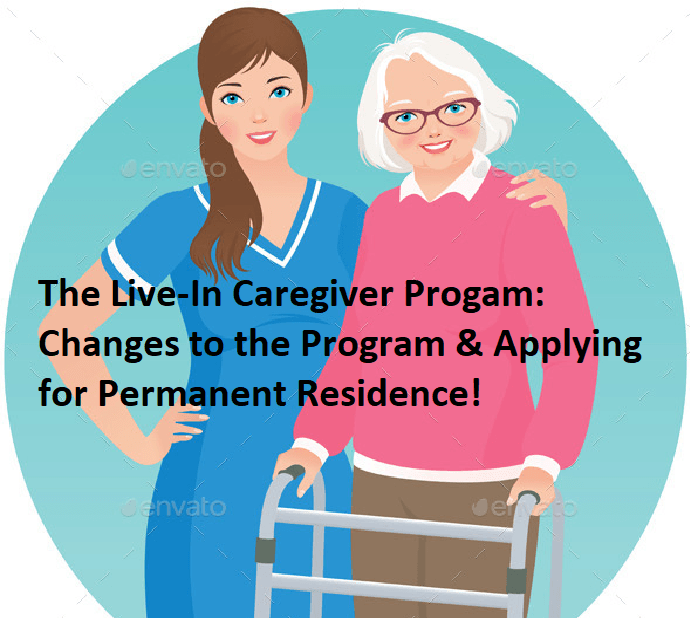The Live-in Caregiver Program Details of Changes and Applying for Permanent Residence
How to Apply for Permanent Residence through the Live-In Caregiver Program
Once you are in Canada working full-time as a live-in caregiver, on a live-in caregiver work permit, you are probably considering applying for permanent residence through the live-in caregiver program as well. There are a variety of requirements you must meet to be eligible for permanent residence through the live-in caregiver program. Therefore, throughout this article, I will cover the requirements to be eligible for permanent residence as a live-in caregiver, and I will help explain the application process. First and foremost though, if you are not already in Canada on a live-in caregiver work permit, you cannot be eligible for permanent residence through the live-in caregiver program.
Eligibility Requirements through the Live-In Caregiver Program
As mentioned, to be eligible to apply for permanent residence through the live-in caregiver program, you must comply with various requirements. The main requirement is that you must have completed 24 months of full time employment, or a total of 3,900 hours within 22 months, within the four years you have worked in Canada as a live-in caregiver from the date you entered Canada to be eligible to apply for permanent residence under the Live-in Caregiver Program. Please note, any time not working, such as sick leave or parental leave, or, time which you are working in Canada but not physically living with your employer, is not counted towards the required length of time an individual must have worked, though, regular vacation time, is counted towards this requirement. To prove the employee has fulfilled this minimum mandatory period of time working as a live-in caregiver, the employer must fill out the Live-in Caregiver – Employer Declaration of Hours Worked (IMM 5634) form, and state the hours an individual worked.
Changes to the Live-In Caregiver Program
Since recently, individuals are no longer able to apply for live-in caregiver work permits. Individuals are still free to work as live-in caregivers in Canada, though; they must apply for a regular work permit. Though, the good news is, if you are already in Canada on a live-in caregiver work permit, you are still eligible to apply for permanent residence through the live-in caregiver program. If you have not been living with your employer during the time you have worked work them, you must apply for permanent residence through the Caring for Children or Caring for People with High Medical Needs pathway.
What Can Affect Your Application
There are a variety of things which can affect your ability to come to Canada as a live-in caregiver, and your application for permanent residency. First and foremost, you must disclose information about all of your family members, and show none of them have a criminal record, pose a security risk, or, have a serious medical problem. It does not matter whether your family is accompanying you to Canada, or not. Their criminal history must be disclosed, and it may be requested that they provide medical examinations.
Applying for an Open Work Permit
At the same time you apply for permanent residence, you can also apply for an open work permit. Having an open work permit means you can work for any eligible employer in Canada, without first having to obtain a positive labor market impact assessment in support of your job offer.
The New Programs
Both the Caring for Children and Caring for People with High Medical Needs programs are pilot programs; meaning they are just are just in the trial phase, and may not stick around forever. The Canadian government has issued a statement which can be found on the CIC website, on the page which you can find information on applying for “Permanent residence through the Caring for Children Program.” This statement claims that the Canadian government is currently reviewing how caregivers should best and most efficiently apply for permanent residence. Therefore, they are testing these pilot programs. These pilots will run until November 29, 2019. By that time, there will be a decision from the Canadian government on how caregivers will apply for permanent residence going forward.
Permanent residence through the Caring for People with High Medical Needs Program
To be eligible to apply for this program, the requirements are very similar, you will need to have two years (24) of full-time work experience as a caregiver and submit your application before the pilot programs expire. Though, unlike the application for permanent residence through the live-in caregiver program, breaks in employment are allowed. This includes, periods where you were not employed, sick leave, and parental leave. Furthermore, you must have experience must be in one of the following jobs listed in the Canadian National Occupational Classification:
- Registered nurses and registered psychiatric nurses (3012)
- Licensed practical nurses (3233)
- Nurse aides, orderlies and patient service associates (3413)
- Home support workers and related occupations (4412)
- Please note, only Home support workers are eligible under 4412. Housekeepers are not eligible.
Finally, you must be admissible to Canada. Your family members must be admissible as well.
Permanent residence through the Caring for Children Program
Similar to the Caring for People with High Medical Needs Program, you must have two years (24) of full-time work experience as a caregiver and submit your application before this pilot program expires. Breaks in employment are allowed, though, any work experience you acquired while you were a full-time student is not applicable. As a home child care provider, your work must match the description in Canada’s National Occupational Classification (NOC) Group 4411. Unfortunately, foster parents are not eligible. You must have cared for children under the age of 18, in your own home or in your employer’s home. Though, unlike the live-in caregiver application for permanent residence, you do not need to have lived in your employer’s home to qualify. Finally, you must be admissible to Canada. Your family members must be admissible as well.
Contact Akrami and Associates
We have dealt with hundreds of Live in Caregiver Application cases. We have helped our clients in their difficult situations and have guided them to draft a more effective application. We can help you draft your application and arrange the required documents. A well-planned and complete application will increase your likelihood of acceptance and will save your from hassle. If you think you may want to hire a live-in caregiver, or apply to be a live-in caregiver, contact Akrami and Associates today! Here, at Akrami & Associates, we work and have experience with many different immigration issues. We have helped many of our clients gain permanent residency in Canada though the live-in caregiver program. Please feel free to contact Akrami & Associates at our office at 416-477-2545 for more information or if you would like to book a consultation with an immigration professional for more advise.
With Akrami and Associates, there is always a way!
Latest Immigrations News

July 18, 2025
C11 vs Intra-Company Transfer (ICT): Understanding the Difference Between Business Immigration Pathways
When exploring Canadian business immigration options, two standout pathways often come up: the C11 Entrepreneur Work Permit and the Intra-Company Transfer (ICT) Program. Both can lead to permanent residency, but they serve very different types of applicants. Understanding the difference between business immigration pathways like the C11 [...]

July 11, 2025
How to Apply for PR on Humanitarian and Compassionate Grounds in Canada
If you’ve run out of immigration options but still have strong reasons to stay, applying for PR on Humanitarian and Compassionate (H&C) grounds in Canada might be your lifeline. This isn't a typical application; it’s a bold request asking the government to make an exception because your [...]

July 6, 2025
Banned from Canada? Not Anymore!
Most people think that a criminal record shuts the door on Canada for good. But that’s simply not true. Yes, it can complicate things. Yes, border agents can (and often do) turn people away. But no, it’s not the end of the road. If you’ve served your [...]

Book a Conslutation
One of our Representatives will
assist you with your matter. Book Now!
Click here

Call us for
more Information
+1-416-477-2545
Toll Free: 1-877-820-7121
Click here

Write Us (Online Form)
Complete our form and one of our
Representatives will contact you.
Click here
Subscribe To Our Newsletter





